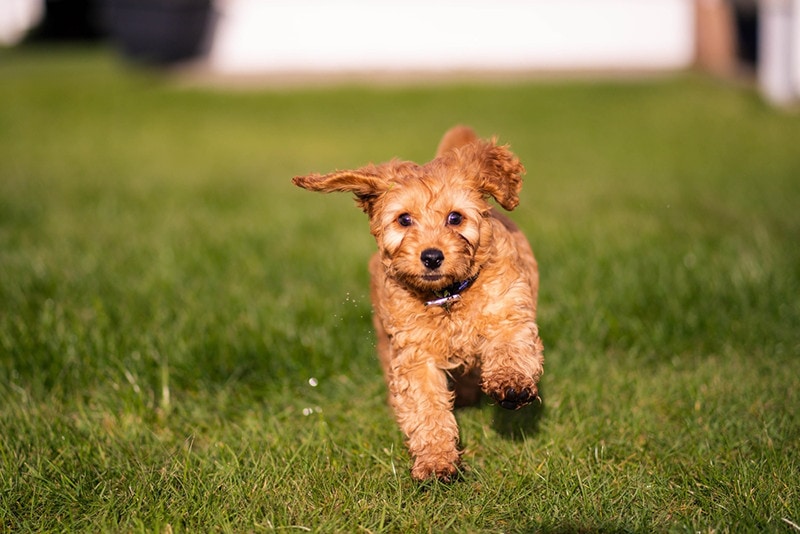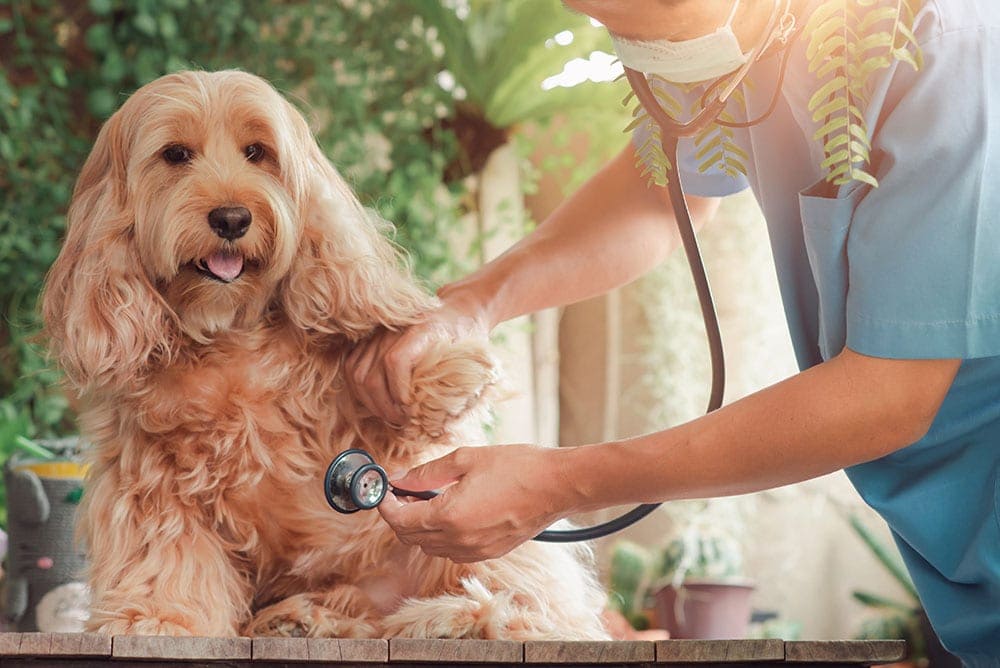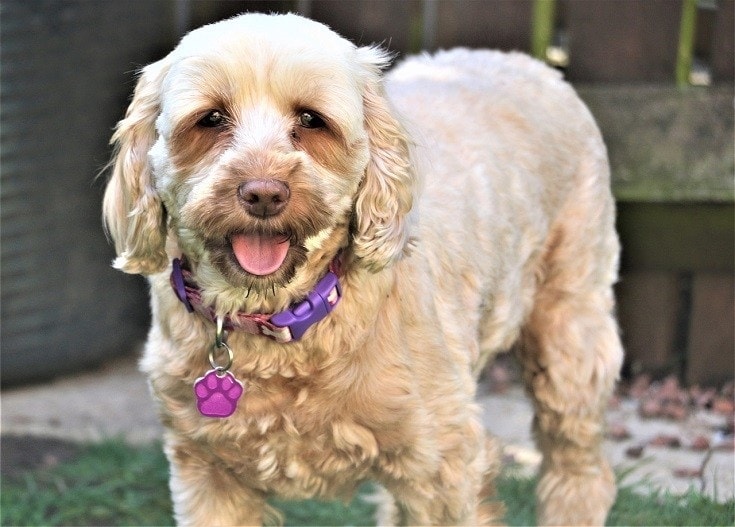Cockapoo Health Issues: 11 Common Concerns
Updated on

The Cockapoo is considered a designer dog, crossbred to be a cute and lovable pet. This dog is part Cocker Spaniel and part Poodle, hence how they got their name. Cockapoos are smart, sociable, family oriented, and eager to please, which makes them excellent as family pets.
However, Cockapoos are prone to a few health conditions that all prospective and new owners should be aware of. Only by understanding these conditions can you be proactive when it comes to healthcare and effectively spot signs of problems before they become too serious. Here are 11 common health conditions you should take note of.
The 11 Most Common Cockapoo Health Problems
1. Glaucoma
Glaucoma is a condition in which the optic nerves in the eyes become damaged. The optic nerve of the eye is responsible for sending information to the brain so the brain can decipher what is being seen. Glaucoma typically develops when too much pressure is being put on the optic nerve in one or both eyes. If left untreated, the condition can lead to blindness. Therefore, treatment should be sought as soon as signs of glaucoma arise.
2. Progressive Retinal Atrophy
This is a condition that affects the eye’s photoreceptor cells, which work to turn light into electrical signals that are sent to the brain for processing. If progressive retinal atrophy has been diagnosed, it means multiple degenerative diseases have developed that are poorly affecting the photoreceptor cells, inhibiting the ability of the brain to decipher the messages being received from the eyes. Eventually, this disease can lead to blindness.

3. Hip Dysplasia
It is common for both Poodles and Cocker Spaniels to develop hip dysplasia, which is why the Cockapoo is also prone to the condition. Hip dysplasia happens when the hip ball cannot sit in the socket correctly. This causes the ball joint to grind and seize as time goes on. The joint deteriorates and the hip no longer functions correctly, if at all. Corrective surgery and other types of treatments can be helpful.
4. Von Willebrand’s Disease
Von Willebrand’s disease can be inherited from either the Cocker Spaniel or the Poodle. Having the disease means an important protein (responsible for controlling bleeding when a blood vessel injury occurs) is missing. If a Cockapoo comes from a line that has had Von Willebrand’s disease, the dog should be screened for the disease early. While no cure is available, treatments are available that can help control the disease.
5. Luxating Patella
Luxating patella is the technical name for knee dislocation. It can be caused by a variety of things, including poor diet, a lack of exercise, excessive joint stress, and genetic structure. Depending on the severity of the condition, a dog may be relieved through joint manipulation, or they might have to have surgery in an attempt to correct the problem. Sometimes, the problem cannot be corrected, though, and the dog must deal with a lifetime of chronic pain.

6. Hypoglycemia
This condition develops when low levels of glucose are circulating in the blood. Glucose is a dog’s main source of energy, and when there is not an ample supply of it in the bloodstream, symptoms can arise, including shakiness, coordination problems, nausea, and even seizures. Extremely low blood sugar levels can also lead to unconsciousness or death if left untreated. Both surgical and medical interventions can be considered as treatment options.
7. Ear Infections
Cockapoos are susceptible to ear infections due to their love of water. When playing in water or swimming in lakes, ponds, and oceans, water can get trapped inside their ears, making it easier for bacteria to grow over time. Since Cockapoos have floppy ears, bacteria can get trapped in the ear canal even if they haven’t been playing or swimming in water. The regular cleaning of their ears with clean cloths or cotton swabs can help keep ear infections at bay.

8. Skin Allergies
Cockapoos are susceptible to developing skin allergies as they grow up. The allergies typically lead to symptoms such as itching and irritation. Allergen sources can come into contact with a Cockapoo outdoors and indoors. These dogs can also be allergic to ingredients in their commercial food. Working with a veterinarian can help you manage your dog’s skin allergies so symptoms are minimal as time goes on.
9. Dental Disease
Like most dogs, Cockapoos can develop dental disease if their teeth and gums are not properly taken care of. A buildup of tartar and plaque is what encourages the development of dental problems. Signs of dental disease include bad breath, pawing at the mouth, drooling, and red or swollen gums. Regular teeth brushing and dental chew treats can help ensure that your Cockapoo never develops dental disease.

10. Thyroid Dysfunction
Unfortunately, Poodles are prone to hypothyroidism, which means their Cockapoo offspring are too. Dogs with hypothyroidism have trouble converting food into energy due to an imbalance in essential hormones. Thyroid dysfunction can lead to symptoms such as dry skin, hair loss, weight loss or gain, and behavioral abnormalities. Treatment to correct thyroid dysfunction may be available. Medications to replace lost thyroid hormones can be prescribed if fixing the thyroid problem is not an option.
11. Collapsed Trachea
A collapsed trachea might sound like an injury, but it is caused by a progressive respiratory problem that results in the tracheal rings collapsing. The process is gradual, so a Cockapoo might show signs of a dry cough and breathing problems before a complete tracheal collapse happens. A collapsed trachea can be fatal, so veterinarian care should be sought as soon as signs of a problem become apparent.

 How to Deal With Possible Health Conditions Before and After They Arise
How to Deal With Possible Health Conditions Before and After They Arise
The best thing that you can do to handle possible health problems with your Cockapoo is to schedule regular veterinarian checkups and ensure that all vaccinations are kept up to date. It is also important to make sure your dog eats a healthy diet throughout their life.
Their food should consist of real meat as a protein source first, along with whole grains and a source of essential fatty acids (like fish oil). The addition of quality fruits and vegetables is always a good idea. Daily exercise in the form of a long walk and/or gameplay is essential to good health and can help keep potential health problems at bay.
If you do notice signs of developing health problems, it’s important to contact your veterinarian as soon as possible. Never feel like you’re overreacting when you have concerns. Small concerns can quickly turn into big problems.
 Final Thoughts
Final Thoughts
Cockapoos are great family pets. They are loving, loyal, smart, and sociable, and they love children. They get along well with other family pets if socialized from a young age, and they take well to obedience training. It’s important to keep tabs on your Cockapoo’s health as they age to ensure a long and happy life for them. Hopefully, this guide helps you be prepared for possible health problems.
Featured Image Credit: Bartlomiej Rybacki, Shutterstock

 How to Deal With Possible Health Conditions Before and After They Arise
How to Deal With Possible Health Conditions Before and After They Arise








